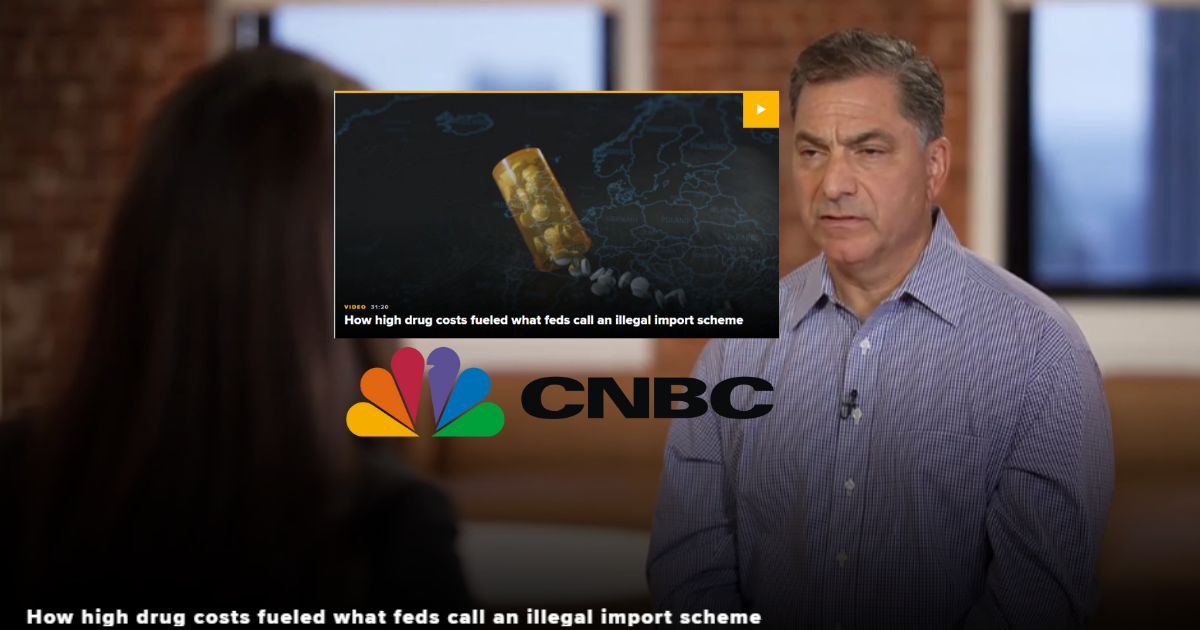Five takeaways from CNBC’s investigation of alternative funding programs
Last week, CNBC aired an investigative documentary about alternative funding programs (AFPs), that third-party vendors offer employers to save them money on their self-funded health care plans. Often, these programs supply patients who need high-cost, specialty medications with unapproved drugs from overseas.
CNBC’s piece is a rare public examination of how these illegal programs operate and the risks they pose to American patients. The Partnership for Safe Medicines has spent years digging into the activities of AFPs, and I was honored, along with a former FDA official, a Department of Homeland Security investigator, and patients caught in the middle, to help CNBC’s dedicated journalists shine a light on this issue.
Here are the five most important lessons viewers should take away from the documentary.
1. AFPs promise savings, but they shift all the danger to the patient.
The sales pitch is always the same – lower costs for employers and cheaper or free specialty medications for patients. But as CNBC’s investigation showed, these savings depend on swapping out FDA-approved medications for foreign versions obtained through questionable channels.
As I said in the piece, “Patients take a safety hit in order to save an employer money.”
Other interviewees reinforced the danger. Leigh Verbois, former director of the FDA’s Office of Drug Security, Integrity and Response, said what AFPs are doing is “illegal – full stop.”
When CNBC correspondent Melissa Lee pointed out that some AFP contracts force patients to assume all liability, Nicole Johnson, a special agent with Homeland Security Investigations, responded, “That's the scheme … They are trying to avoid being held responsible for this.”
2. The “Canadian pharmacy” narrative is a myth, and AFP supply chains are opaque by design.
Many AFPs rely on the comforting idea that they source only from “Tier 1 countries” like Canada and the UK. But the reality, as CNBC showed, is that those products often come from sites in Turkey, India, New Zealand, and other countries, with no connection to a “Tier 1” source.
In my interview, I emphasized that people assume “Canada” means safe. But unless you can trace a medicine’s full chain of custody – and AFPs cannot – you have no idea where the drug actually came from. Homeland Security’s Johnson echoed this, noting that AFPs often use unverified suppliers and potentially illicit online pharmacies, and ship prescriptions directly to U.S. patients to evade customs scrutiny. “Customs has no idea how many prescriptions have made it to U.S. citizens,” she said.
What Johnson described is the kind of insecure supply chain that criminals exploit to sell counterfeit and substandard drugs.
3. Patients are often coerced into using these dangerous programs.
One of the most troubling revelations was that some employers pressure workers to use AFPs, telling them their medications must be obtained through an AFP or they would have to pay full price.
Why would an employer want to put their employees in that position?
“AFPs are going to target lower income, lower paying jobs,” Johnson said. “This is going to be a school district, a county government, a religious organization where there's not a lot of money in excess for health benefit plans.”
By preying on the most vulnerable, AFPs create a system where employers and employees feel like there’s no other option. As I said in my interview, “It’s no choice at all. Patients are put in an impossible position, and it's a crime that they're still paying health care premiums, and yet they are not getting FDA approved medicine, legal medicine or safe medicine.”
This isn’t consumer empowerment. It is financial coercion disguised as a health care benefit.
4. There is no legal gray area. AFPs depend on misinterpretations of the law.
AFPs invoke the FDA’s “personal importation policy” as their legal cover, but Leigh Verbois reiterated that importing drugs that are FDA-approved and commercially available in the U.S. is not legal personal importation. “There is no gray area,” she said.
PSM has been documenting this for years: millions of dollars’ worth of unapproved, unsafe medication has been shipped to Americans under the guises of “personal importation” and savings. That savings, however, shouldn’t be at the expense of patients who could be supplied with unregulated medicines that don’t treat their illnesses, or may actively harm them.
In one interview, CNBC correspondent Lee pressed an AFP executive about his business:
“The FDA tells us specifically, we asked specifically about this business model, and they told us it is illegal to import drugs that are available and sold in the United States,” she said. “Those are exactly the drugs that you import. Correct?”
The executive hesitated before replying, “I have no comment.”
Seems legit.
5. Ultimately, patients are the victims. We must not fail them.
The most powerful perspectives in the CNBC piece were those of patients forced into impossible decisions.
An HIV patient who received Turkish-labeled Biktarvy feared it was counterfeit. A man with MS was flown repeatedly to the Cayman Islands or Bahamas to pick up his own medication so the company could circumvent U.S. import laws. Teachers, city employees, and people living paycheck to paycheck were forced to accept foreign drugs or forgo their treatments..
“We are viewing our patients in the United States as victims of these crimes,” Johnson said. “This company is providing them with illicit pharmaceuticals, and so we would consider that the company itself is the criminal in this scenario, not the patient.”
It is never worth taking medicine that is unsafe, and patients shouldn’t be put in the position of choosing between unsafe medicine and no medicine at all.
I hope CNBC’s investigation drives more visibility, more accountability, and ultimately, more urgency to ensure that Americans can access the medications they need without having to gamble with their lives.

